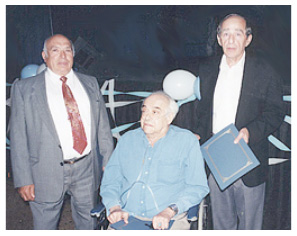Jewish Post and News – published in Winnipeg, Manitoba, Canada: 2nd May 2014
 Three Of The Winnipeggers Who Fought In Israel’s War Of Independence Pause For A Picture, After Receiving Commemorative Pins At April 30, 1998 Israel At 50 Celebration At Winnipeg Convention Centre. From Left: Sam Singer, Jack Hurtig And Allan Chapnick. (1998 Photo)
Three Of The Winnipeggers Who Fought In Israel’s War Of Independence Pause For A Picture, After Receiving Commemorative Pins At April 30, 1998 Israel At 50 Celebration At Winnipeg Convention Centre. From Left: Sam Singer, Jack Hurtig And Allan Chapnick. (1998 Photo)
Ed. note: The following article originally appeared in 1998
By JONATHON NARVEY
Israel’s 50th birthday was last week, but the country might not have lived to see it without the help of Canadian soldiers.
Hundreds of Canadians fought in Israel’s War of Independence in 1948-1949. About 40 of the volunteers came from Winnipeg.
When the State of Israel was declared in May 1948, Egyptian, Syrian, Jordanian and Iraqi armies invaded, threatening to destroy it in its inception.
“The Arabs had promised another holocaust,” said Allan Chapnick, 68, a Winnipeg resident and veteran of the conflict in the Middle East. “Haganah (the Jewish para-military force that formed the roots of the Israeli Defense Force) sent out recruiters all over the world” to find volunteers to fight for Israel.
Some volunteers fought to be a part of an historical event. “From the days of Pharaoh in Egypt to the ghettos in Europe, the Jews never fought back. This was a time to go fight,” said Jack Hurtig, 75, a former lieutenant colonel in the Israeli Bomber Command.
Foreign volunteers, collectively called Machal, made up the “backbone of technical sophistication in the newly-formed IDF,” said Chapnick, who fought in the Anglo-Saxon Fourth Anti-Tank Troop. Mahal was composed of people of many nationalities and creeds. “There were a lot of people of many nationalities and creeds. There were a lot of people who weren’t Jewish who fought,” said Hurtig.
While many Mahal soldiers settled down after the war to raise families in Israel, the veteran-survivors from Winnipeg returned home. “I came to Israel for only one reason. To fight,” said Hurtig. “When it was over, there was no reason for me to stay.”
Mahal volunteers made up 95 per cent of the air force and all of the navy.
The multitude of different languages spoken by the volunteers caused unforeseen hardships. “There were a lot of friendly-fire casualties because of bad communications. They had to divide us up into different commands formed on Iinguistic lines,” said Chapnick.
Many of the volunteers were also veterans of the war against Germany which ended three years earlier. “I felt I had something to contribute,” said Aaron Ruvinsky, 78, who served as a wireless air-gunner during the war. Ruvinsky was referring to the skills and experience he acquired in the Canadian and British air forces over the skies of Europe in the Second World War.
The Canadians in Mahal needed to improvise and make the most use of scarce resources to help win the war. “I personally welded rusted rivets onto a DC-3 (transport plane) to make bomb racks,” said Hurtig. “We had almost no weapons or ammunition. We had to capture them from the enemy, first,” said Chapnick.

